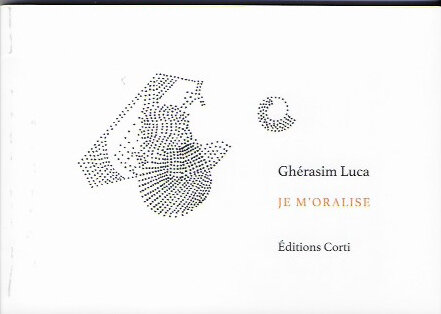| HOME | UP |
JE M’ORALISE[1]
by Ghérasim
Luca
Translated by Howard Slater

It is difficult for me to express myself
in visual language
there
could be in the very idea of creation
something that escapes passive
description
as it stems necessarily from a conceptual language
In this language that serves to designate objects
the word has only one or two meanings
and it imprisons sound
Let's break the form in which it got stuck
so new relationships appear
Sound is exalted
the sleeping secrets
at the bottom of words arise
The one who listens is introduced to a
vibrational world
which assumes simultaneous physical participation in mental connection
Free the breath and every word becomes a signal
I'm truly connected
to a poetic tradition
a vague and
somewhat illegitimate tradition
But the very term poetry seems to me to
be false
I prefer ontophonie
Whoever opens the word opens matter
and the word is only the material support of a quest
whose aim is the
transmutation of the real
More than situating myself in relation to tradition or revolution I'm trying to
reveal the resonance of my being
Poetry is a silensophone
The poem
is a place of operation
The word is subjected to a series of sound
mutations
each of its facets liberates the multiplicities of meaning
with
which they are laden
Today I travel across a vast expanse
where din
and silence collide
where the poem takes the form of a shadow
that has
been set going
Better
the poem eclipses itself
before its
consequences
In other words
JE M’ORALISE
See Ghérasim Luca,
Je m’oralise,
Éditions Corti 2018. This book reproduces the original handwritten poem and its
accompanying ink drawings. It is unclear as to when this poem was first written
as Luca passed away in 1994.
Thanks due to Alan Dent.
[1]
[Translator’s note] The literal rendering of this title is ‘I speak
myself’ but we have retained the French title with its intended and
heavily sarcastic homophonic rendition as ‘I moralise.’